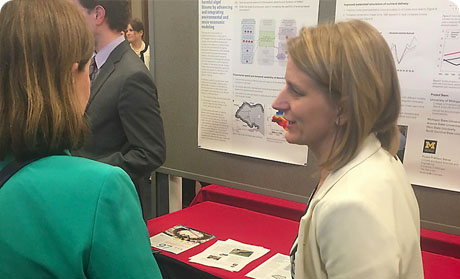Read Full Article at UofM Public Engagement & Impact
Read related article at The University Record

Allison Steiner: Associate Professor of Climate and Space Sciences and Engineering
College of Engineering
Algae has been an increasing problem in Lake Erie over the past decade, and they can create toxins that impact a critical source of drinking water, recreation, and fishing. U-M professor Allison Steiner is leading a research team funded by the National Science Foundation that’s trying to pinpoint the main drivers of harmful algal blooms, how to better predict them, and how to develop usable information for coastal stakeholders.
Steiner is giving an overview of the project this week at the Coalition for National Science Funding’s annual Capitol Hill exhibition.
“We will be highlighting this interdisciplinary project that brings together physical and social scientists to develop strategies for reducing harmful algal blooms in western Lake Erie,” said Steiner. “We are understanding how climate influences freshwater ecosystems, and have scientists and stakeholders working together to improve coastal decision-making and sustainability.”
The research team includes:

Allison Steiner (right), associate professor of climate and space sciences and engineering, and earth and environmental sciences, was in Washington, D.C., on Wednesday to discuss her research on harmful algal blooms.
- Allison Steiner, PI, University of Michigan
- Don Scavia (co-I), University of Michigan
- Dan Obenour (co-I), North Carolina State University
- Frank Lupi (co-I), Michigan State University
- Maria Carmen Lemos (co-I), University of Michigan
- Christine Kirchhoff (co-I), University of Connecticut
- Margaret Kalcic, Ohio State University
- Rebecca Muenich, Arizona State University
- Isabella Bertani, University of Michigan
- Awoke Teshager, University of Michigan
- Nate Manning, University of Michigan
- Colleen Long, University of Michigan
- Yu-Chen Wang, University of Michigan

